Will Guyana's oil bonanza benefit its poorest people?
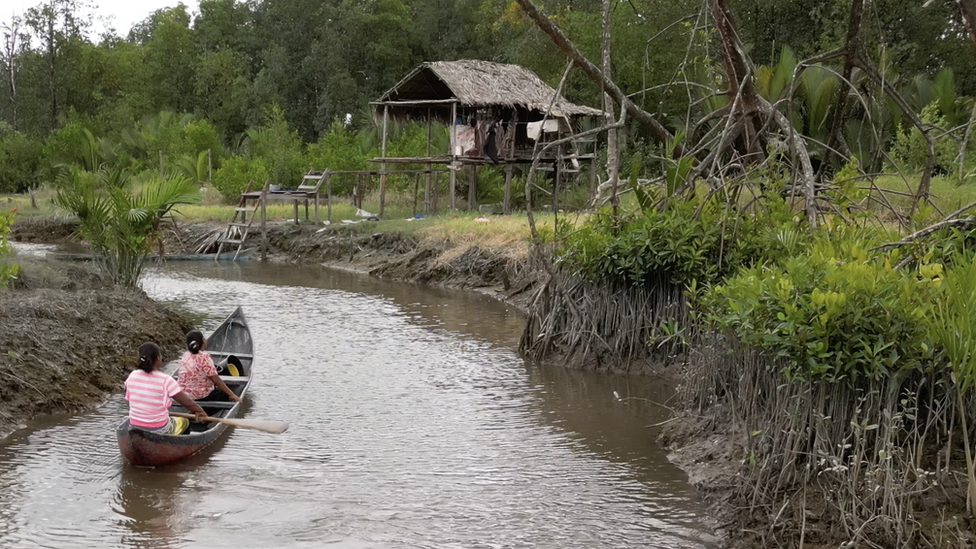
- Oops!Something went wrong.Please try again later.
Smith Creek in Guyana's far northwest borderland with Venezuela is home to 300 people living in a collection of dilapidated cabins perched precariously on wooden stilts.
A gaggle of young children, some naked, play on the muddy bankside of the salty, silty creek.
Traditional canoes - carved out of single tree trunks - glide by, carrying families and their supplies. The nearest source of fresh, drinkable water is almost two hours of steady paddling away.
In Smith Creek it is hard to believe Guyana can lay claim to being the world's fastest growing economy.
No sign here that the country has become a premier-league petrostate. Eleven billion barrels of oil lie in the Stabroek Block subsea reserve off Guyana's coast, but fossil fuel riches are not yet flowing to the people of Smith Creek.
Instead they eke out a living as best they can. Fishing, farming, relying on the remittances of family members who go to work in the gold mines far to the south.
Look closely though and there are the first signs of change in Smith Creek.
The biggest structure in the settlement is a newly built concrete shed with solar panels on its roof, and specialised food processing equipment in its immaculately clean interior.

Here a group of locals, all of them indigenous Warrau women, gather to tend and pick the surrounding beds of pepper bushes - special Wiri Wiri peppers: tiny, red and highly prized in Guyanese cooking.
The women are running their own commercial enterprise - growing, drying and selling their crop and earning a form of economic independence for the first time in their lives.
Working along the row of bushes, head grower Evonnedy Wells picks the small round peppers and puts them on a metal tray. She told me how important the project is to the community.
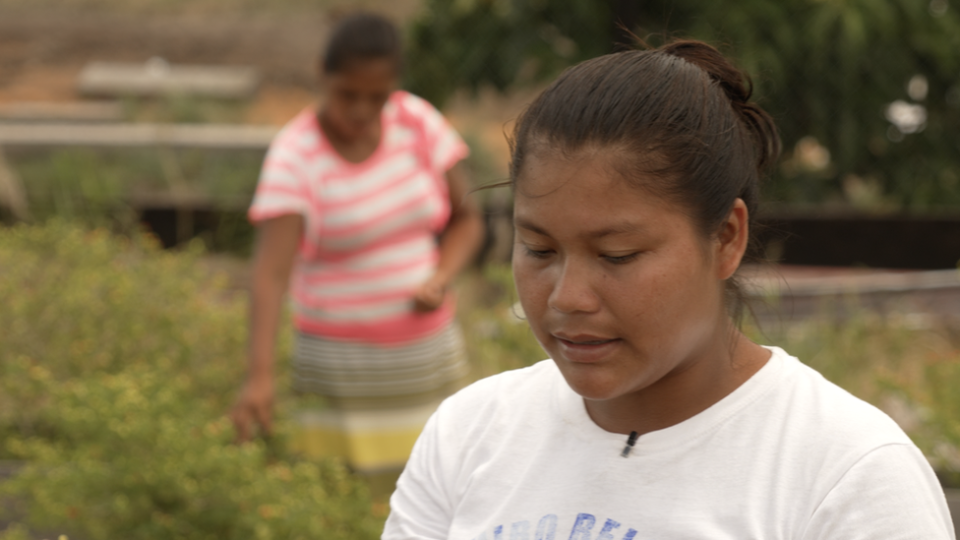
"Women can buy things for their children and family," she said. "Before, there were no jobs in Smith Creek. We were struggling. Now we have jobs to do."
Annette Arjoon is a co-ordinator of the pepper project and herself of indigenous heritage.
"The women have limited opportunities, so it's extremely challenging," she tells me. "The project has made a real difference. It's a source of income for them, which is supplemented by their own farming and catching crabs."
Remote it may be, but the patchwork of rivers, mangroves and thick forest around Smith Creek has acquired new-found strategic significance in the past year.
Because this is where the swathe of Guyanese territory known as Essequibo - the two-thirds of Guyana that lies west of the Essequibo River - meets the Venezuelan border.
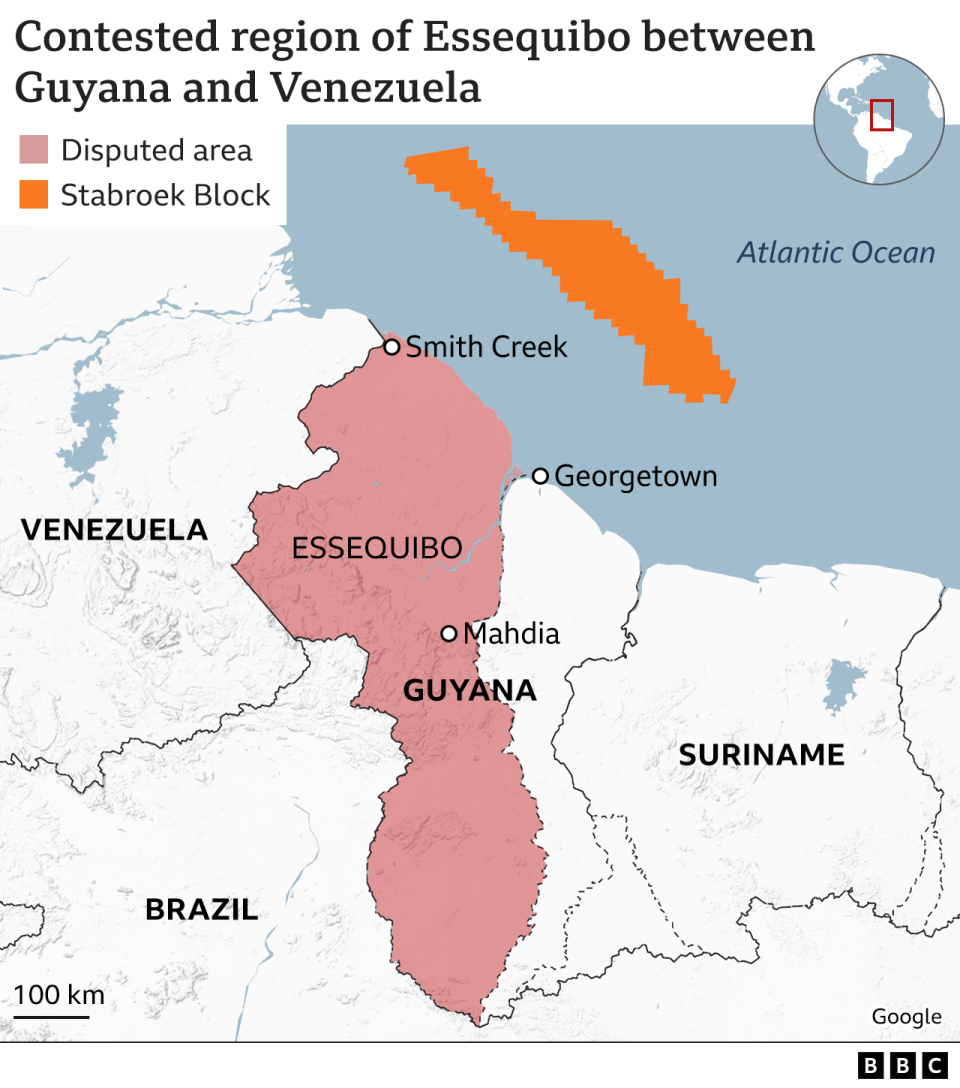
For the past year, Venezuela's President Nicolás Maduro has been noisily pushing his country's long-standing claim to Essequibo.
Just downstream from Smith Creek, the border between Guyana and Venezuela runs across the Barima River. Both countries have floating border posts on the river, just 100m (330ft) apart.
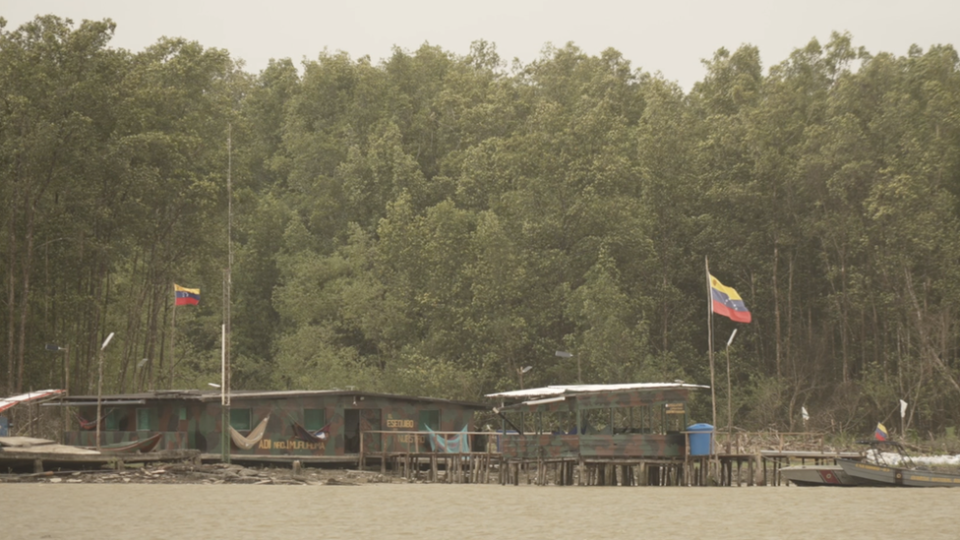
Intelligence reports suggest the Maduro government is building a new military base further inland, and Venezuelan army and naval units have reportedly been beefed up close to Essequibo. But on this stretch of the border all is quiet.
The majority of the local population is indigenous Warrau. They live in the forest on both sides of the border and cross with impunity.
Whatever the tensions between Caracas and Georgetown, the locals seem blithely unconcerned. Black market trade across the border continues unhindered. Venezuelan boats dock on the banks of the Barima river close to the Guyanese town of Mabaruma.
They barter cheap Venezuelan diesel for fish to take back home.
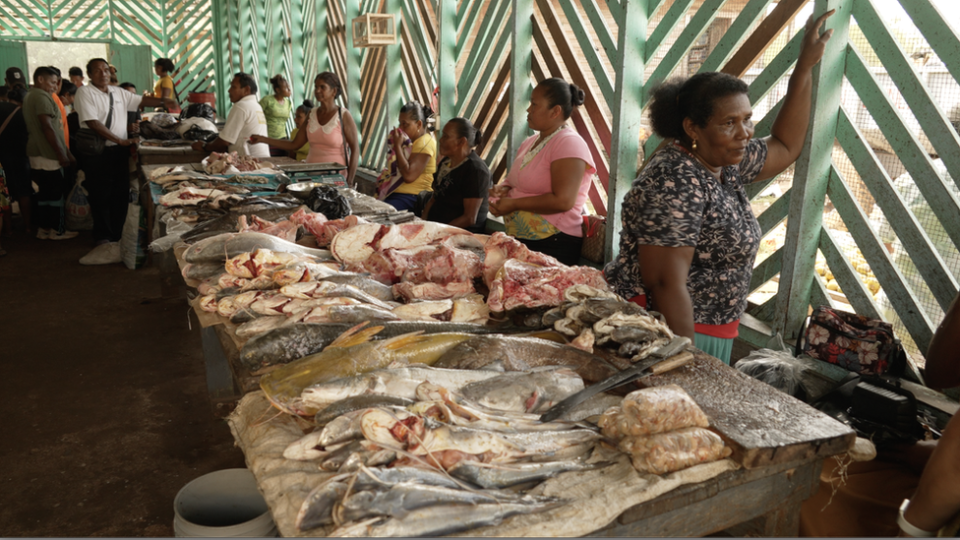
They hide their vessels' names, but one skipper was happy to sell a bagful of ice to this passing reporter.
So what lies behind the Venezuelans' decision to raise the temperature in the historic dispute over Essequibo?
Their grievance dates back to the border demarcation of 1899, which they say was rigged against them). The world woke up to the problem last December when President Maduro staged a referendum on the issue which, predictably, showed overwhelming popular support for Venezuela's claim to sovereignty.
President Maduro, it seems, sees political advantage in pushing the Essequibo claim. It stirs nationalist sentiment and diverts attention away from socialist Venezuela's failing economy - a win-win with a presidential election looming later this year.
But there is the whiff of economic opportunism in the air too. Essequibo has long been known to be resource rich.
In Mahdia, in the centre of Guyana (also within Essequibo's boundaries), gold mining is the dominant industry.
I visited the Red Hole mine being worked by owner Bernard Christopher Alphonso and his crew of indigenous labourers.
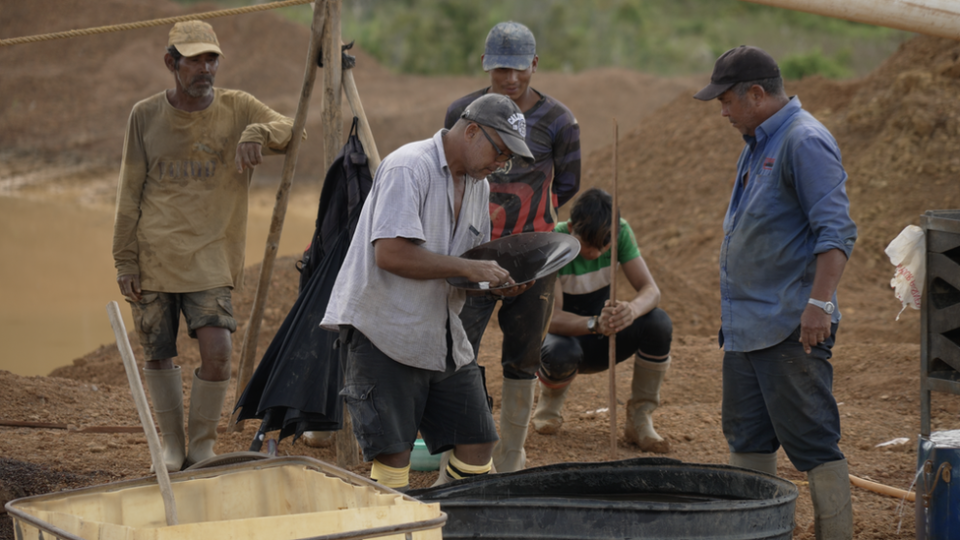
Originally from Guyana's coast, Bernard tells me he moved to the area many years ago. "We ventured up into the interior to mine gold - El Dorado," he says, "that's why we're here".
His family own a dozen concessions around Mahdia.
The crew had been rinsing, sifting and sorting dirt from one open pit for a week. I watched as they took the nuggets and powder they had extracted and smelted it all down into a glistening gold bar.
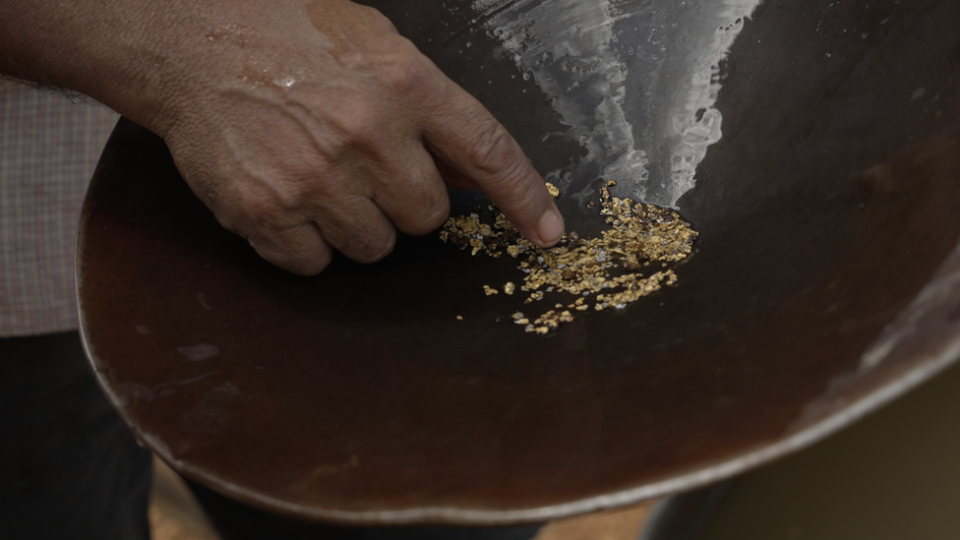
"Six ounces," declared Bernard Alphonso with a smile. "That's US $12,000 (£9,500) at today's price."
The forest around the town is pock-marked with scars from present and past mining operations. Environmental concerns about deforestation and mercury toxifying local soil and water have not dimmed the allure of gold.
Essequibo may be sparsely populated, densely forested and mostly inaccessible by road, but it offers the promise of long-term resource riches for those who rule it.
And that is without considering the greatest potential prize of all. Which comes not with control of Essequibo's land mass - the size of Greece - but with the offshore ownership rights that come with it.
Venezuela has watched Guyana forge a partnership with oil giant ExxonMobil to exploit the vast oil and gas reserves in the Stabroek Block more than 150km off the Guyanese coast, and insists that this seabed and its riches rightfully belong to Caracas as a part of the Essequibo claim.
So what happens next in the dispute over Essequibo?
President Maduro has dialled down his more bellicose rhetoric. He and Guyana's President Irfaan Ali have promised to resolve their differences peacefully.
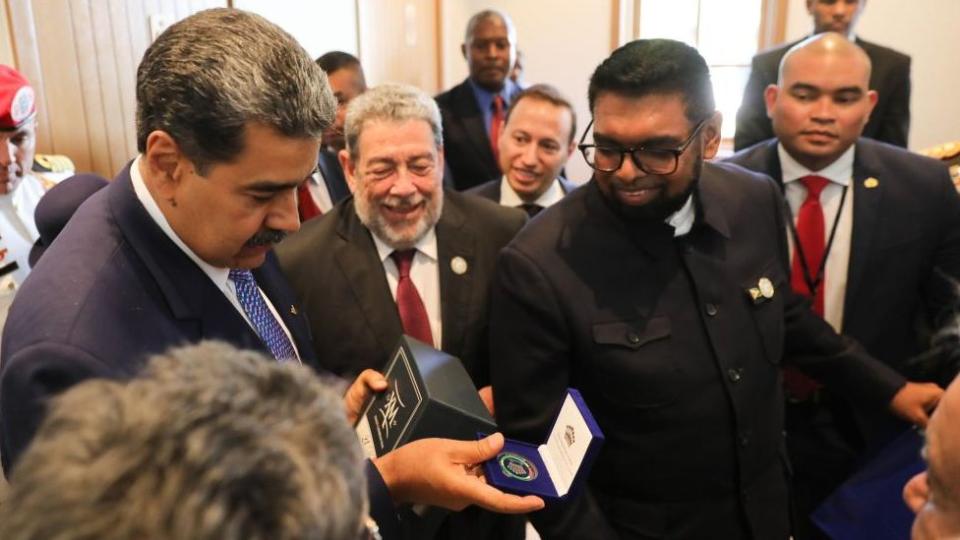
But that has not stopped Venezuela's parliament from passing a law declaring a federal state in the disputed area. Guyana's government condemned this as a "flagrant violation" of its sovereignty.
When I spoke to President Ali in Guyana's capital Georgetown, he told me his country had the support of the international community: "If there is any action by anyone to destabilize our country and to invade in any way, shape or form, we will call upon every force and every friend to help us and to work with us to protect our territorial integrity."
For now armed conflict, and forcible seizure of Essequibo by Venezuela's far larger military, seems unlikely. And for many who live there it is not even the most pressing concern.
Back on Guyana's remote north coast, close to Venezuela, Annette Arjoon took me to Shell Beach, a precious breeding ground for several species of giant turtles.
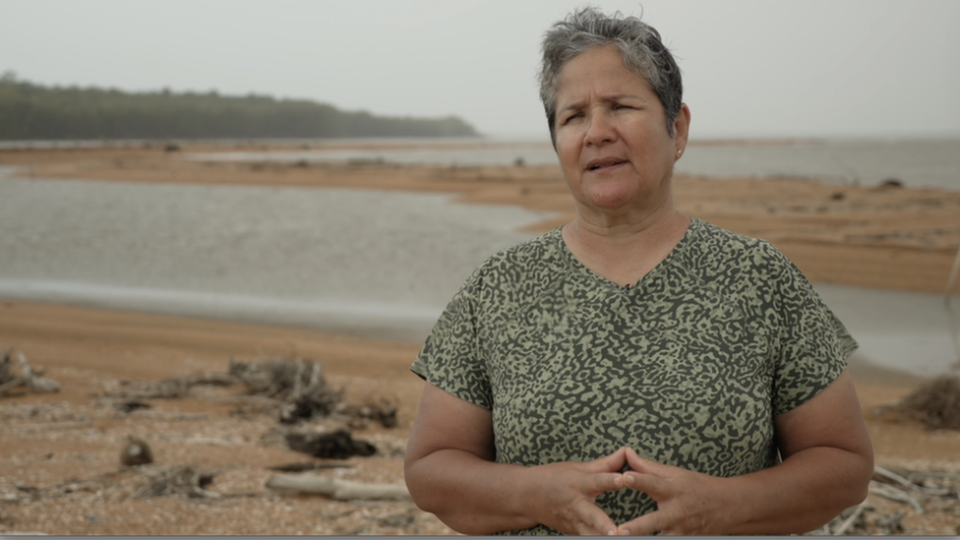
"In terms of the government pursuing an oil and gas sector, and the revenues from that coming back into these vulnerable and impoverished communities, I think it's a good thing," she says.
"But a thing that needs to be done in an environmentally responsible way."
Guyana is determined to fight off Venezuela's claim to its land and resources. The tougher challenge may be ensuring that the country's new-found wealth doesn't just deepen existing inequality, and environmental vulnerability, but benefits all of the country's people, even in the remotest corners of Essequibo.
For more about this story, listen to Stephen Sackur's HARDTalk: On the road in Guyana.


